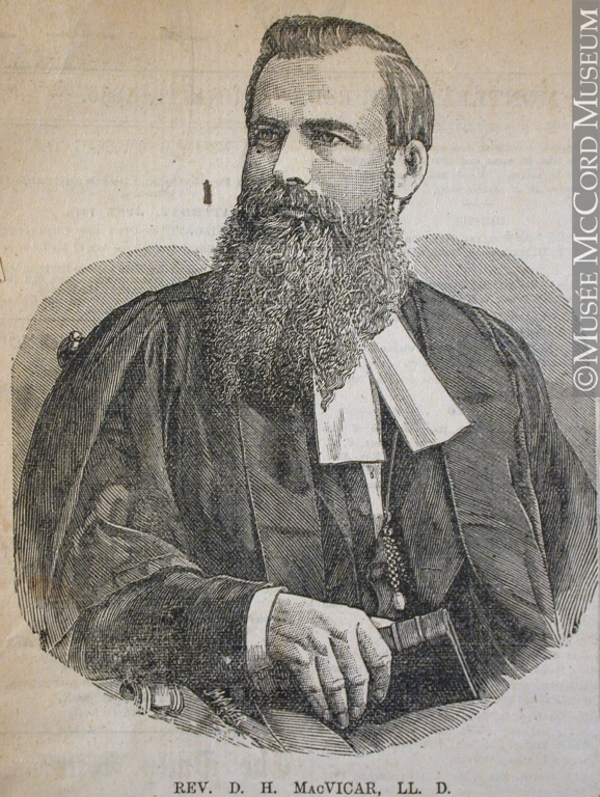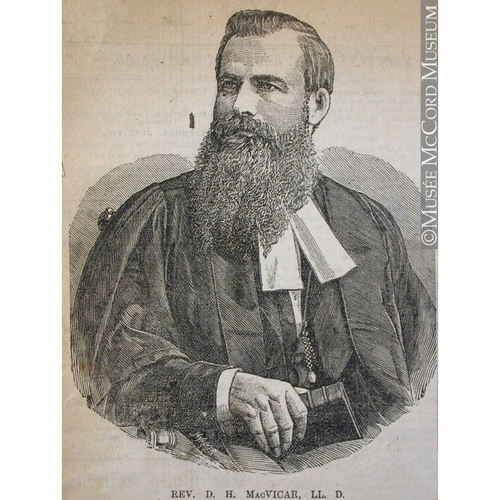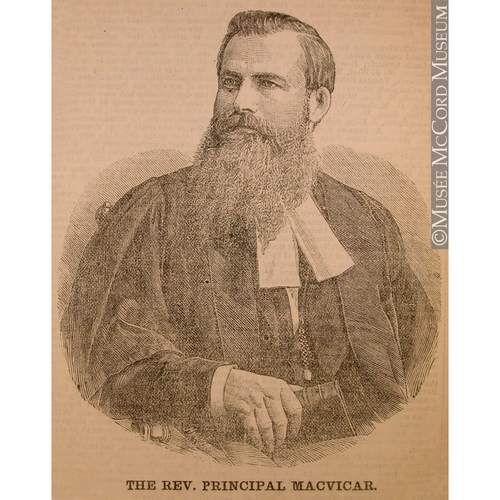
Source: Link
MacVICAR, DONALD HARVEY, Presbyterian minister, educator, and author; b. 29 Nov. 1831 near Campbeltown, Scotland, seventh son of the 12 children of John MacVicar, a farmer, and Janet MacTavish; m. 1 May 1860 Eleanor Goulding (for whom he adopted the name Harvey) of Downsview (North York), Upper Canada, and they had three sons and two daughters; d. 15 Dec. 1902 in Montreal.
In 1835 Donald MacVicar’s family settled near Chatham, Upper Canada. Donald, who as a child spoke only Gaelic, was educated at a local school, at the Toronto Academy, run by the Reverend Alexander Gale*, and at the University of Toronto. He entered Knox College, the theological school of the Synod of the Presbyterian Church of Canada (Free Church), in 1855 and there was influenced by Professor George Paxton Young*. During the second and third years of his studies he taught classics and English at a private academy in Toronto operated by his brother Malcolm, who later became chancellor of McMaster University. He spent the summer of 1858 at a mission in Collingwood, and on graduation the following year he was licensed to preach by the Presbytery of Toronto.
MacVicar’s preaching ability was quickly recognized, and while working at the Temperance Hall on Brock Street in Toronto he declined calls to at least four congregations. Instead, he was ordained on 19 Oct. 1859 to Knox Church, Guelph, where he soon revived a waning congregation. A year later, however, encouraged by Young, he accepted a call to Coté Street Church, which had Montreal’s largest Free Church congregation. He had preached there as a student and was inducted on 30 Jan. 1861.
Under MacVicar’s energetic leadership the Coté Street congregation almost doubled its membership in eight years. Prominent businessmen such as Peter and John* Redpath and Joseph Mackay* supported the evangelizing programs of the congregation, including a plan to establish a bilingual theological college connected with McGill College to train ministers, particularly for work among French Canadian Roman Catholics. In 1865 the Presbyterian College of Montreal was chartered. From 1867 MacVicar, who had served on several administrative committees of Knox College earlier in the decade, was named annually to the Presbyterian College’s board of management, senate, and board of examiners; he would serve as chairman of the senate from 1868 until his death. In June 1868, after Young refused the professorship of divinity, MacVicar was appointed. The college had opened the previous year in the basement of Erskine Presbyterian Church with ten students. Before its own buildings were finished in 1873, the year he was made principal, MacVicar had rejected calls from several wealthy churches in the United States. In 1874 he successfully promoted the establishment of a French theological department in the college as part of the Presbyterian church’s French Canadian evangelization program.
In 1861, just two years after his ordination, the Presbyterian Church of Canada had joined with the United Presbyterian Church in Canada to form the Canada Presbyterian Church. MacVicar was appointed to several committees of the new church’s synod. Between 1861 and 1868 he served seven terms on committees concerning foreign and home missions, and in 1867 he was appointed to a committee on French Canadian evangelization, where he continued as a regularly reappointed member from 1872, and as chairman from 1879 until his death.
On the union of Presbyterian churches in 1875 which created the Presbyterian Church in Canada, MacVicar offered to resign as principal of the Presbyterian College if it was amalgamated with Morrin College, Quebec [see John Cook*]. Instead the new church retained all the colleges of the uniting bodies. This decision put such a heavy financial strain on the institutions that the creation of endowment funds was required. Since the Presbyterian College was to be maintained, MacVicar called in 1880 for larger facilities, and David Morrice, a successful Montreal manufacturer, donated a convocation hall, library, dining hall, and additional dormitories.
Although an effective and inspiring teacher, MacVicar held conservative theological views and his dogmatism reflected a rigid Calvinism already considered outdated by many younger Presbyterians. The late Victorian “theological revolution” shifted emphasis from atonement to incarnation, but MacVicar still defended the primacy of revealed over natural theology. He argued against biblical higher criticism and the introduction of instrumental music in Presbyterian worship; however, he eventually accepted a conservative use of higher criticism in biblical studies. He originally opposed the Reverend Daniel James Macdonnell* during his famous “heresy” trial, but provided the resolution that opened the way to resolve the conflict over the right to personal judgement in doctrinal issues.
As contemporaries suggested, preaching seemed to be MacVicar’s proper sphere, and his hour-long sermons were occasionally published in the Pulpit Treasury (New York). He contributed material to the Presbyterian College’s Journal (including a “College hymn”), to the Presbyterian Church’s Sunday-school periodical Teacher’s Monthly (Toronto), and to the Presbyterian Quarterly Review (Philadelphia) on a wide range of subjects including missions, education, sociology, and Roman Catholicism. For the Westminster (Toronto), he wrote articles and short biographies of Young, Sir John William Dawson*, and his friend the Protestant convert Charles Chiniquy*. He also wrote the introduction to Chiniquy’s Forty years in the church of Christ (Toronto, 1900). MacVicar attended every meeting during his lifetime of the Alliance of Reformed Churches holding the Presbyterian System, at Edinburgh in 1877, Philadelphia in 1880, Belfast in 1884, London in 1888, Toronto in 1892, Glasgow in 1896, and Washington in 1899, and read papers at Philadelphia, Toronto, and Glasgow.
MacVicar’s interest in education and missions had occupied him from early in his career. In Guelph he had been a school trustee, and in Montreal, where he was secretary of the Protestant Educational Association, the provincial government appointed him to the Protestant Board of School Commissioners in 1865, removed him in 1876, and reappointed him in 1878. He was chairman of the commission when he resigned in 1881, but the government reappointed him again in 1884 and he served as chairman for another 15 years before his death. In 1870 MacVicar had received an honorary lld from McGill College, the following year he taught logic there, and later he was made a fellow of the university. For seven years he served on the McGill Normal School committee. In 1883 he was awarded an honorary dd by Knox College. He was in frequent demand as a public lecturer, and wrote two arithmetic textbooks that were used in the schools of Quebec and Ontario.
MacVicar was interested in missions to China and to Jewish immigrants to Canada, but his primary concern was missions to French Canadians. He thus became involved with the schools of the French Canadian Missionary Society at Pointe-aux-Trembles (Montreal) [see Olympe Hoerner*] and in bringing Chiniquy to Montreal and supporting him during the anti-Chiniquy riots in 1875. In a paper delivered to a conference of the Evangelical Alliance in Montreal, MacVicar was among the first to oppose the Jesuits’ Estates Bill introduced in 1888 by the government of Honoré Mercier*. He supported the “equal rights” movement that arose following the passage of the act, being co-convener with Macdonnell of a committee of the General Assembly of the Presbyterian Church in Canada on the defence of civil and religious rights. He was the author of public letters on the issue, and of a pamphlet, Roman Catholicism in Canada, published in 1889, but he took no part in public agitation on the question because he disliked political involvement.
MacVicar was active on several other standing committees of the church. In 1876 he had been a member of the Home Mission Committee, and from 1889 to 1897 and again from 1899 to his death he was involved with the church’s foreign missions (western division). In addition he served on the committees on systematic beneficence, or fund-raising (1891), sabbath observance and legislation (1899–1902), and sabbath schools (1901–2). In 1881 he was elected moderator of the General Assembly. On 15 Dec. 1902, after chairing a meeting of the committee on French Canadian evangelization, MacVicar returned to the Presbyterian College; he failed to appear at a lecture and was found dead in his office. The next issue of the Presbyterian College Journal contained 15 articles about and two poetic eulogies of his multifaceted career.
D. H. MacVicar is the author of In memoriam, a sermon preached in the Canada Presbyterian Church, Coté Street, Montreal, on sabbath, March 14th, 1869, on the occasion of the death of John Redpath, esq., Terrace Bank (Montreal, 1869); Recent aspects of materialism; being a lecture delivered at the opening of the session of 1871–72, of the Presbyterian College, Montreal (Montreal, 1871); A complete arithmetic, oral and written, designed for the use of common and high schools and collegiate institutes (Montreal, 1879); A primary arithmetic: including oral, slate, and written exercises (Montreal, 1879; repr. 1884); Hindrances and helps to the spread of Presbyterianism (Toronto, 1879); Moral culture: an essential factor in public education, an address delivered before the Ontario Teachers’ Association, Toronto, August 14th, 1879 (n.p., n.d.); The teacher in the study and in the classroom, an address delivered before the Quebec Teachers’ Association, at Quebec, Oct. 17, 1879 (Montreal, 1880); Questions of the day: lectures delivered in the David Morrice Hall, Montreal, in 1883–84 (Montreal, 1885); Roman Catholicism in Canada . . . (Montreal, 1889); The teacher reproduced in the pupil; an address delivered before the Provincial Sunday School Convention, Montreal, January 30th, 1890 (Montreal, [1890]; and The office and work of elders (Montreal, 1894; 2nd ed., 1895).
AC, Montréal, État civil, Presbytériens, Crescent Street Church (Montreal), 18 Dec. 1902. J. H. MacVicar, Life and work of Donald Harvey MacVicar, d.d., ll.d. (Toronto, 1904). H. K. Markell, History of the Presbyterian College, Montreal, 1865–1986 (Montreal, 1987). G. C. Pidgeon, “Principal MacVicar – a leader in French evangelization,” Missionary pathfinders: Presbyterian laborers at home and abroad, ed. W. S. MacTavish (Toronto, 1907). Presbyterian (Toronto), new ser., 1 (July–December 1902): 774–75. Presbyterian College of Montreal, Journal, 22 (1902–3): 169–246. Presbyterian Record, 28 (1903): 3.
Cite This Article
John S. Moir, “MacVICAR, DONALD HARVEY,” in Dictionary of Canadian Biography, vol. 13, University of Toronto/Université Laval, 2003–, accessed December 30, 2025, https://www.biographi.ca/en/bio/macvicar_donald_harvey_13E.html.
The citation above shows the format for footnotes and endnotes according to the Chicago manual of style (16th edition). Information to be used in other citation formats:
| Permalink: | https://www.biographi.ca/en/bio/macvicar_donald_harvey_13E.html |
| Author of Article: | John S. Moir |
| Title of Article: | MacVICAR, DONALD HARVEY |
| Publication Name: | Dictionary of Canadian Biography, vol. 13 |
| Publisher: | University of Toronto/Université Laval |
| Year of publication: | 1994 |
| Year of revision: | 1994 |
| Access Date: | December 30, 2025 |




